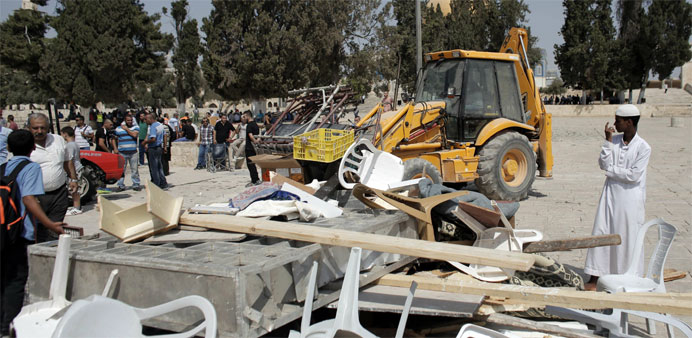AFP/ Jerusalem
Israeli Prime Minister Benjamin Netanyahu vowed "war" on stone-throwers Wednesday with tougher penalties and new rules for security forces on when to open fire, following riots at a Jerusalem holy site.
Netanyahu spoke of his plans to crack down on Palestinian protesters who hurl rocks and firebombs as he visited the site of a car accident that killed a Jewish man at the weekend.
Police have said the accident may have been caused by stone-throwing, the latest in a number of such incidents in and around Jerusalem.
"This stone is one too many," Netanyahu said, according to his office. "We are declaring war on those who throw stones and bottles, and rioters."
The prime minister also held an emergency meeting with security officials on Tuesday night where he discussed minimum sentences for those who throw stones or petrol bombs as well as his plan to alter rules of engagement.
He also said authorities planned to "massively increase fines for minors and their families" involved in such activity. He has not said how rules of engagement could be altered.
The statements, while mainly referring to street protests and rioting, followed three days of clashes between Palestinians and Israeli police at Jerusalem's flashpoint Al-Aqsa mosque compound.
Rioting erupted at the site sacred to both faiths as Jews celebrated their new year between Sunday evening and Tuesday evening.
Police carried out raids over the three days to stop youths who had barricaded themselves inside the mosque from harassing visiting Jews, according to the Israeli authorities.
Protesters threw stones, fireworks and other objects, while security forces fired stun grenades.
- 'Relentless war' -
Calm returned on Wednesday apart from a brief scuffle between police and members of the Waqf, the Jordanian-run organisation that administers the site.
The complex in Jerusalem's Old City is the site of frequent clashes.
It is the third-holiest site in Islam and home to the Dome of the Rock and Al-Aqsa mosque. It is also the holiest site in Judaism which venerates it as the Temple Mount.
Jews are allowed to visit the compound, but cannot pray there to avoid provoking tensions with Muslim worshippers.
Israel seized east Jerusalem, where Al-Aqsa is located, in the 1967 Six-Day War and later annexed it in a move never recognised by the international community.
Muslim protesters fear Israel will seek to change rules governing the site, with far-right Jewish groups pushing for more access to the compound and even efforts by fringe organisations to erect a new temple.
Netanyahu has repeatedly said he is committed to the "status quo", but Palestinians remain deeply suspicious.
Palestinian president Mahmud Abbas accused Israel on Wednesday of "waging a fierce and relentless war against us in Jerusalem."
- 'House of prayer for all' -
Israeli rabbi Yehuda Glick, a hardline campaigner for Jewish prayer rights at the compound who survived a murder attempt last year, said Wednesday he believed it was important for Jews to visit.
"The people who have incited terror on the Temple Mount do not want Jews to be there," he told AFP as he stood in the alleyways of Jerusalem's Old City after his son visited the compound. "If we run away from here, we are giving in to terror."
A group of about 10 Jews among the first to visit the compound Wednesday were closely watched and escorted by Israeli police and the Waqf.
They were allowed to wear their religious skullcaps, but had to leave their holy books at the entrance.
Some at the compound yelled "Allahu Akbar" to the group as they toured the perimeter of the hilltop complex.
A 31-year-old who only gave his name as Elisha said he believed rules regarding the site would eventually change.
"This place will become a house of prayer for all nations," he said.
As they exited into the alleyways of the Old City, a group of women protesters yelled at them.
One of the protesters, Hoda Abu-Snenieh, 41 and a mother of seven, said of Al-Aqsa that Jews want to "put a temple over it".
Separately on Wednesday, Israel reinstated the detention without trial of Palestinian Mohammed Allan, whose recent two-month hunger strike brought him near death and increased tensions in the occupied West Bank.
Allan, said by Islamic Jihad to be a member of the militant group, restarted his hunger strike after his return to detention, which had been suspended while he received medical treatment, according to his lawyer.

